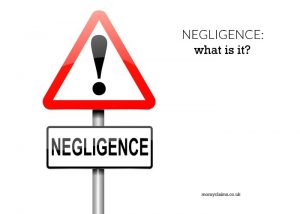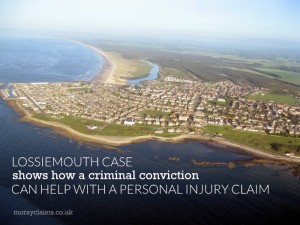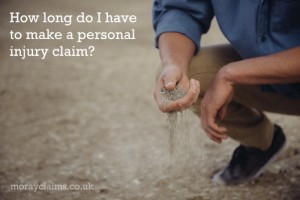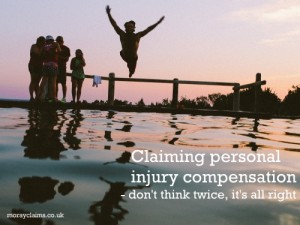Accidents which are no one's fault ... An accident is an event which could not reasonably have been foreseen by anyone and for which no one should be held responsible. If your injury is the result of such a mishap - a ‘pure’ accident - you will not be able to make a successful claim for compensation. ... Accidents which are someone's fault The modern idea of negligence dates from the 1930s. Negligence: what is it ? The basic definition of negligence that lawyers now use comes from the Scottish case of Donoghue –v- Stevenson. As a result of that case and other later cases, the law places defined limits on the classes of person who can claim and the types of injury for which they can claim. If you are going to be able to claim successfully, the person who injured you has to have been in such a position that they ought to have had you in mind when considering the possible impact of their actions in the circumstances. In practice, from the point of view of the person owing the duty of Continue Reading
How a Criminal Conviction helps with a Personal Injury Claim
A personal injury claim arising from an incident which took place in a Lossiemouth pizza takeaway has provided a good example of how a criminal conviction can be used in a personal injury claim to pave the way for the claim to succeed. This is a procedural decision from the All-Scotland Personal Injury Court in Edinburgh. In this article we will consider three aspects of how a criminal conviction helps with a personal injury claim. Firstly, we will look at the law in relation to the use of criminal convictions in civil proceedings such as personal injury claims. Secondly, we will see how the reference to a criminal conviction in the Lossiemouth case helped the claimant establish that compensation should be payable to him. Finally, we will look at the question of whether it is ever possible for a person who is blamed for an accident/injury to argue their way out of it even if there is a criminal conviction against them. Continue Reading
The Most Important Medical Negligence Case Of The Last 30 Years?
A Lanarkshire mother’s 15-year quest to obtain compensation for injuries her son suffered during birth has ended successfully. Her claim failed twice in the Court of Session but her second and final right of appeal - to the Supreme Court – found all 7 judges to be in her favour. Her solicitor, Fred Tyler of Balfour & Manson, Edinburgh, described the Supreme Court’s decision as “almost certainly the most significant medical negligence judgement in 30 years - a momentous decision which will affect the doctor-patient relationship throughout the UK.” Was he correct to describe it as the most important medical negligence case of the last 30 years? In this article, we look at various ways in which the case of Montgomery –v- Lanarkshire Health Board is significant. Facts of the case Nadine Montgomery is diabetic and gave birth to her son, Sam, in 1999 at Bellshill Maternity Hospital in Lanarkshire. Diabetic women are more likely to have larger-than-average babies and Mrs. Montgomery Continue Reading
How Long Do I Have To Make A Personal Injury Claim?
I recently had to travel to a family funeral in Germany with my wife. We flew with KLM from Aberdeen to Cologne via Amsterdam. On the way there, we had one hour in Amsterdam Airport to catch our connecting flight. From previous experience, we knew this might be a problem. Schiphol is a sprawling airport. It is designed as a central hub with “spokes” going off from the centre and, on each spoke, there are up to 30 Gates. Gates with low numbers are close to the central hub and Gates with higher numbers are further out. On arrival at Amsterdam, we were on time. The aircraft’s parking stance was at Gate C18 and we understood we had to get to Gate D4. “C” and “D” are two different spokes, so we would have to get from one Gate to the other via the hub. When we checked the departure boards, we found that the departure Gate had been changed to D28. Travelator walkways on the spokes help to speed you on your way but, at the hub, we had to go through Security again and there Continue Reading
Pedestrian RTA Claim from Aberdeenshire Illustrates Difficulty of Contributory Negligence
The other day, I got an enquiry from a potential client about a tenancy deposit dispute. Having heard the details, I told him I didn’t think there would be any basis for making a claim. He wanted to continue to discuss the matter, so I had to tell him that I was not going to change my mind and, if he did not accept my advice, he should consider getting a second opinion from another solicitor. At that point, he told me that he had already spoken to several other firms of solicitors in Elgin about the same issue. So, I asked him what advice they had given him. He said: “The same advice that you have given me about it.” I smiled wryly as he said that and the call ended amicably. I had mixed feelings about it. Of course, I would like to feel that possible clients are coming to me with their enquiries as their “first choice” solicitor - which was clearly not the case here. More strongly, though, it struck me as ironic that several solicitors had all apparently Continue Reading
Slip / Trip Accidents And Why The Location Matters
If you have ever fallen over, you’ll know that embarrassment is often the overwhelming feeling, at first. After a trip or slip in a public place - such as a busy supermarket, shopping centre or street – we will tend to pick ourselves up quickly and make as fast an exit as possible, even if we are hobbling on our way. An accident of this type may be a pure accident – no one’s fault but your own – such as a trip while you are walking and updating your Facebook status at the same time. Even a momentary distraction can be enough to cause a fall. On the other hand, if your fall is due to someone else’s negligence (such as the occupier of land or a local authority), you may be able to make a claim for compensation for personal injury. This article considers slip / trip accidents and why the location matters when applying the law to the circumstances and deciding whether any personal injury claim is likely to succeed. Common accident claim locations For there to be the Continue Reading
Patients Need Honesty about Medical Errors
The Scottish Government is consulting on imposing a “duty of candour” for healthcare providers. In its response to the consultation, the Association of Personal Injury Lawyers (APIL), a not-for-profit organisation which campaigns for the rights of injured people, has emphasised the need for medical and social care staff to be forthcoming and open about medical mistakes. Marie Morrison and Peter Brash of Grigor & Young / Moray Claims are members of APIL and accredited as Senior Litigators by APIL. Grigor & Young’s Elgin Office has corporate accreditation from APIL. An apology would often be enough The experience of most solicitors who deal with claims for medical negligence is that the majority of people who are injured as a result of a medical blunder simply want a clear explanation of what went wrong and what happened. The injured person wants to know that any lessons which could have been learned from the experience have been learned and will be put into practice for the Continue Reading
Claiming Personal Injury Compensation – Don’t Think Twice, It’s All Right
There are so many factors to discourage you from making a personal injury claim these days. The Westminster Government almost seem to be trying to outlaw claims for whiplash injury and there is a constant undercurrent of suggestion that such claimants are fraudsters or at least exaggerating their symptoms. So, if you are thinking of claiming personal injury compensation following an accident, should you do so? An unattractive “entitlement” mentality Most of us find it difficult to warm to people who claim entitlement to positions or privileges just because of who they are or what they may claim to have done in the past. But legal entitlements are different Fair enough, the legal entitlement to personal injury compensation, where the injury is caused by the negligence of another, is not a "deserving cause" in everyone's eyes. Usually, these doubters are folk who have never been in the position of an injury victim themselves. It is different when you are the victim. Personal injury Continue Reading
100 Moray Claims Blogs – A Round-Up
We launched the Moray Claims website in October 2012. This is the 100th blog article. So, as we reach the milestone of 100 Moray Claims blogs, what are the main themes which have evolved via the blog during the last 2 years? They ask, You answer I’ve looked to the “They ask, You answer” advice of Marcus Sheridan for guidance, even if most of the time it’s meant predicting rather than knowing what you might want to know about personal injury law. Moray Claims is a trading name of Grigor & Young and so we started off this blog describing Moray Claims as “Not just another accident claims company”. Probably a bit too cryptic as a headline. Belatedly, months later, I realised it might be a good idea to explain what is Moray Claims and the purpose of the blog. In the buzz-speak of the content marketing gurus online, I’ve tried to provide meaningful content, to a targeted audience (you folks in Moray and a bit beyond that) and be authentically helpful. Helping you in Continue Reading
Bicycle Accident in Moray – How To Claim For Personal Injury
If you do any amount of cycling, you will probably have had a near miss or two. Cyclists are vulnerable road users and the risk is always there of an accident or collision with a car, lorry or even another cyclist. Moray has a few designated cycle paths, notably the tracks between Elgin and RAF Lossiemouth and between Forres and Findhorn. However, on numerous minor roads in Moray, the national speed limit is combined with narrow carriageways and restricted visibility. Add to this the ever-increasing volume of traffic on our roads and you can see why an increasing number of cyclists are falling victim to injury as the result of a bicycle accident in Moray. If you are a cyclist unlucky enough to be injured in an accident, you may choose to make a personal injury claim so you can receive compensation for your injuries and other losses. It is likely that your bike will be damaged, possibly beyond economic repair, and you will want any compensation to include an element to pay Continue Reading
Insurers Not Getting In Touch After An RTA (Why That Might Be)
How long does it take for Insurers to get in touch after a road traffic accident? That’s a question we received recently in the following terms: “I was involved in an RTA two months ago. I have not heard from the insurance company yet. How long does it take for them to get in touch? The accident was not my fault.” A significant collision - with lots of post-accident worries It turns out this accident involved a rear end shunt at a junction. The vehicle was pushed right off the road by the impact. The injured driver who contacted us had been knocked unconscious as a result of the crash. He spent two nights in hospital, was off work for several weeks and lost wages. An incorrect assumption He had been driving his works van and thought that his employers’ motor insurers would take care of his claim for his injuries and his financial losses, including his loss of earnings. This was a classic situation where you, as the accident victim, have suffered injury through no Continue Reading
Fatal Accident Claims in Scotland: Increased Compensation levels
Claims by three members of the family of a man who died as the result of a road traffic accident in Glasgow have been awarded damages totalling £106,500. Lady Wise, in the Court of Session, decided that the award of compensation in a previous similar case had been too low. She set the damages level for each claimant by applying an uplift of approximately 50% on the awards in the previous case. Pedestrian crossing accident Gavin Currie was 25 years old when he was knocked down on a zebra crossing on 28 December 2011. He died in hospital 2 days later. The Court described Gavin as a “fine young man with good employment prospects and a happy and settled family life”. He came from a close-knit family. Only value of claim disputed Liability for the accident was not in dispute but there was disagreement about the level of compensation to be paid to each of his parents and to his brother, Euan, by the insurers of the negligent driver. Tension between Judge and Jury damages Continue Reading






